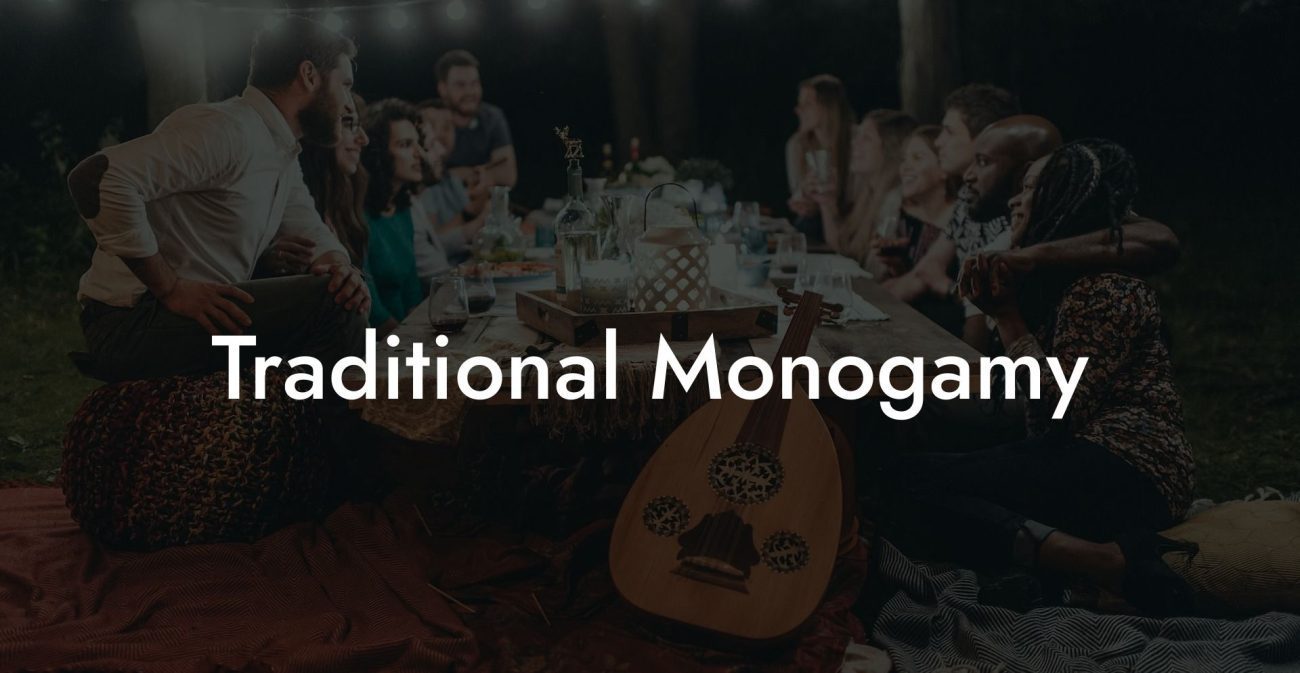Romantic Monogamy

Picture a timeless love story unfolding like a classic film—a love that is profound, intentional, and unwavering in its focus. Romantic monogamy is that enduring narrative where two hearts commit solely to one another, crafting a bond that grows deeper with each shared secret, every quiet moment, and every challenge overcome together. In a world where relationships often shift with the tides of modern life, romantic monogamy stands as a testament to the beauty of exclusive, deeply intimate connection. This guide to romantic monogamy will take you on a journey through its definition, historical evolution, philosophical foundations, benefits, challenges, and practical strategies for nurturing a love that lasts a lifetime.
Have you ever wondered if monogamy is just a stupid little experiment? Open relationships, polyamory, relationship anarchy...find out which relationship dynamic suits you best with our one minute relationship test. See if you are just conforming to "societal norms". Reveal your truth >>
Quick Links to Useful Sections
- Understanding Romantic Monogamy
- Defining Romantic Monogamy
- Historical and Cultural Context
- The Evolution of Monogamous Relationships
- Philosophical Foundations of Romantic Monogamy
- The Beauty of Exclusive Commitment
- Core Ethical Principles
- Benefits of Romantic Monogamy
- Deep Emotional Intimacy
- Simplicity and Clarity
- Stability and Security
- Opportunities for Personal Growth
- Social and Cultural Acceptance
- Challenges of Romantic Monogamy
- Risk of Emotional Dependency
- Unrealistic Expectations
- Difficulty in Navigating Change
- External Pressures
- Strategies for Thriving in Romantic Monogamy
- Prioritize Open, Honest Communication
- Set Realistic Expectations and Maintain Individuality
- Establish Clear boundaries and Revisit Them Regularly
- Invest in Self-Care and Mutual Growth
- Build a Supportive Network
- Embrace Change and Stay Adaptable
- Real-Life Stories and Testimonials
- Case Study: Taylor and Jordan’s Deep Connection
- Case Study: Alex’s Journey of Individual and Mutual Growth
- Expert Insights on Romantic Monogamy
- FAQ: Your Romantic Monogamy Questions Answered
Understanding Romantic Monogamy
Defining Romantic Monogamy
Romantic monogamy is the practice of forming and maintaining a single, exclusive romantic relationship at a time. It is built on the principle that the most profound emotional, physical, and spiritual intimacy is achieved when two individuals dedicate themselves entirely to each other. Unlike models that involve multiple partners, romantic monogamy channels all energy, commitment, and passion into one relationship, creating a deep and stable bond.
In this model, both partners consciously decide to invest their time, resources, and emotional energy solely in one another. The focus is not on limitation but on depth: a promise to explore every facet of intimacy and build a partnership that endures through life’s challenges.
Historical and Cultural Context
The Evolution of Monogamous Relationships
Throughout history, monogamous relationships have been seen as the cornerstone of social stability and personal fulfillment. Ancient civilizations often practiced various forms of partnership, yet over time, monogamy emerged as the dominant model in many cultures, influenced by religious doctrines, economic necessities, and legal frameworks.
From the chivalric romances of medieval Europe to the idealized love stories depicted in modern literature and cinema, romantic monogamy has been celebrated as the epitome of commitment and intimacy. Although the model has been critiqued for its limitations in addressing human complexity, it remains a deeply ingrained ideal for many, symbolizing trust, loyalty, and the promise of everlasting connection.
Today, while alternative relationship models have gained traction, romantic monogamy continues to be the most common and culturally supported form of relationship. Its enduring appeal lies in its simplicity and the profound emotional security it can provide.
Philosophical Foundations of Romantic Monogamy
The Beauty of Exclusive Commitment
At the heart of romantic monogamy is the belief that a single, exclusive connection can serve as the ultimate source of emotional and spiritual fulfillment. This model is founded on the idea that by concentrating your love, energy, and commitment on one person, you create a relationship that is not only resilient but also capable of deep, transformative growth.
Exclusivity fosters an environment where vulnerability is met with unwavering support. When you choose to invest entirely in one relationship, you are free to open up completely, knowing that your partner is equally committed to safeguarding that intimacy. The result is a profound sense of security and belonging that can empower both individuals to pursue personal dreams and overcome life’s obstacles.
Core Ethical Principles
Romantic monogamy is underpinned by several key ethical principles:
- Trust and Loyalty: Trust is the foundation upon which exclusive relationships are built. Loyalty is not just a duty—it is an expression of deep commitment and mutual respect.
- Honesty and Transparency: Open communication about feelings, desires, and challenges is essential for maintaining the integrity of the relationship.
- Mutual Growth: A monogamous bond provides a safe space for personal development, where both partners are encouraged to evolve and support one another’s growth.
- Emotional Security: The promise of exclusive commitment creates a reliable sanctuary where both individuals can explore their deepest emotions without fear of judgment or betrayal.
Benefits of Romantic Monogamy
Deep Emotional Intimacy
One of the most celebrated aspects of romantic monogamy is the profound emotional intimacy it can foster. When both partners are devoted solely to one another, there is an unparalleled opportunity to build a deep, trusting connection. This intimacy is cultivated through daily acts of care, honest conversations, and shared life experiences, creating a bond that can weather even the most turbulent times.
Simplicity and Clarity
With only one partner in the equation, the dynamics of the relationship are straightforward. Decision-making processes become simpler, communication channels remain clear, and the risk of misunderstandings or divided loyalties is minimized. This clarity often leads to a harmonious environment where both partners feel secure and supported.
Stability and Security
Exclusivity in a monogamous relationship creates a stable foundation that can provide emotional security in an unpredictable world. This stability is often reflected in long-term plans, such as building a family, pursuing joint goals, or establishing a home together. The assurance that your partner is committed exclusively to you can be profoundly comforting.
Opportunities for Personal Growth
The focused nature of romantic monogamy allows both individuals to explore and develop their personal identities within the safety of a committed partnership. The challenges you face together become catalysts for self-improvement, while the successes reinforce your confidence and shared vision for the future.
Social and Cultural Acceptance
In many cultures, traditional monogamy is not only the norm but also widely celebrated. This societal acceptance can ease external pressures, making it simpler to navigate family dynamics, legal matters, and social expectations. For many, the validation from their broader community reinforces the value of their exclusive commitment.
Challenges of Romantic Monogamy
Risk of Emotional Dependency
One of the potential drawbacks of exclusive relationships is the risk of becoming overly dependent on your partner for emotional support. While deep intimacy is a strength, it can sometimes lead to an imbalance where one person feels responsible for the other’s happiness. It’s essential to cultivate a sense of individuality and maintain external support networks to prevent emotional burnout.
Unrealistic Expectations
Cultural narratives often paint a picture of perfect, fairy-tale romance, which can create unrealistic expectations for what a relationship should be. When reality inevitably falls short of these ideals, disappointment and conflict may arise. It’s important to set realistic expectations and to recognize that every relationship has its ups and downs.
Difficulty in Navigating Change
People evolve, and so do their needs and desires. In a long-term, monogamous relationship, the challenge lies in adapting to these changes together. Shifts in career, personal interests, or emotional needs can create friction if not managed through open dialogue and mutual support. Regularly reassessing your relationship goals and boundaries is key to sustaining long-term happiness.
External Pressures
Despite its cultural acceptance, traditional monogamy is not immune to external pressures. Societal norms, family expectations, and cultural stereotypes can sometimes impose stress on a relationship, especially if either partner feels the need to conform to an idealized version of love that doesn’t match their reality.
It’s vital to create a shared vision of what your relationship means to you, independent of external expectations.
Strategies for Thriving in Romantic Monogamy
Prioritize Open, Honest Communication
Communication is the heartbeat of any successful relationship. Establish regular times for meaningful conversations—whether it’s a daily check-in, weekly date nights, or monthly relationship reviews. Use “I” statements to express your feelings and actively listen to your partner. This practice helps prevent misunderstandings and builds a strong foundation of trust.
Consider using digital tools like shared calendars or journaling apps to track your conversations and revisit your progress over time.
Set Realistic Expectations and Maintain Individuality
While deep emotional connection is the goal, it’s important to remember that no one person can meet every need. Encourage each other to pursue personal interests, hobbies, and friendships outside of your relationship. This not only enriches your individual lives but also brings new energy and perspectives into your partnership.
Balancing togetherness with personal space ensures that both partners remain fulfilled and resilient.
Establish Clear boundaries and Revisit Them Regularly
Boundaries are essential for maintaining a healthy balance in a relationship. Discuss what you expect regarding time together, emotional support, and personal space. Document these boundaries if needed and set a routine for revisiting them—especially during times of change or after major life events.
Clear boundaries help both partners feel secure and prevent potential conflicts from escalating.
Invest in Self-Care and Mutual Growth
Self-care is the foundation of a healthy, balanced relationship. Make time for activities that nourish your mind, body, and soul—whether it’s exercise, meditation, creative hobbies, or simply enjoying quiet time alone. When you prioritize your well-being, you’re better equipped to contribute positively to your relationship.
Consider engaging in activities that foster mutual growth, such as couples’ workshops, joint hobbies, or even regular therapy sessions to enhance communication and understanding.
Build a Supportive Network
Surround yourselves with friends, family, and communities that share your values and support your relationship. A strong external support network provides additional layers of emotional stability and can offer valuable insights when challenges arise. Whether it’s joining relationship forums, attending community events, or simply spending time with like-minded couples, a supportive network is key.
Embrace Change and Stay Adaptable
Recognize that both you and your partner will evolve over time. Embrace change as a natural part of life, and be open to renegotiating your relationship’s terms as needed. Regularly assess your goals and boundaries together, and be willing to adjust to ensure that your connection remains vibrant and fulfilling.
Real-Life Stories and Testimonials
Case Study: Taylor and Jordan’s Deep Connection
Taylor and Jordan have been together for over fifteen years. Their relationship, rooted in exclusive commitment, has weathered the challenges of career changes, family responsibilities, and personal growth. They credit their success to regular communication and the practice of setting realistic expectations. Weekly date nights and monthly reviews of their relationship goals have helped them maintain a deep emotional connection, even during difficult times.
Their story is a testament to the transformative power of exclusive love when nurtured with intention and open dialogue.
Case Study: Alex’s Journey of Individual and Mutual Growth
After a series of turbulent relationships, Alex chose to embrace exclusive monogamy as a path to deeper self-understanding and personal fulfillment. With the support of a close-knit community and regular self-reflection practices, Alex learned to balance individuality with the commitment of romantic monogamy. Over time, Alex’s relationship evolved into a secure, emotionally rich partnership that continues to serve as a source of strength and inspiration.
Alex’s experience highlights that romantic monogamy is not about limitation but about creating a space for profound personal and mutual growth.
Expert Insights on Romantic Monogamy
Relationship experts often emphasize that the beauty of exclusive, romantic monogamy lies in its ability to foster deep emotional intimacy and personal growth. Dr. Elena Rivera, a relationship therapist, explains, “Romantic monogamy allows for a concentrated, powerful connection between partners. When both individuals are committed to open communication and self-care, the relationship can become a transformative journey of mutual support and growth.”
Relationship coach Marcus Lee adds, “The key to thriving in a monogamous relationship is not just about commitment to one person—it’s also about committing to personal growth. When you invest in yourself as much as you invest in your partner, you create a dynamic and resilient bond.”
FAQ: Your Romantic Monogamy Questions Answered
1. What is romantic monogamy?
Romantic monogamy is a relationship model in which two individuals commit exclusively to one another, focusing their emotional, romantic, and often sexual energy on building a deep, long-term bond.
2. How does romantic monogamy differ from serial monogamy?
In romantic monogamy, the commitment is exclusive and enduring between two people, while serial monogamy involves a series of exclusive relationships over time.
3. What are the benefits of romantic monogamy?
Benefits include deep emotional intimacy, a stable and secure partnership, simplicity in communication, and the opportunity for significant personal growth as you build a lifelong bond.
4. Can romantic monogamy lead to personal growth?
Yes, focusing on one partner allows for continuous self-reflection and mutual support, which can lead to profound personal and relational growth.
5. What challenges might arise in a romantic monogamous relationship?
Challenges can include the risk of emotional dependency, unrealistic expectations, and difficulties in adapting to change. These challenges can be managed through open communication, self-care, and external support networks.
6. How important is communication in romantic monogamy?
Communication is critical; regular, honest dialogue is essential for resolving conflicts, managing expectations, and deepening emotional intimacy.
7. How do we set boundaries in a monogamous relationship?
Boundaries should be established through self-reflection and open conversation, defining what is acceptable in terms of emotional, physical, and personal space. These boundaries should be revisited regularly.
8. What if I feel overly dependent on my partner?
It’s important to maintain a balanced life by pursuing personal interests, nurturing friendships, and engaging in self-care to ensure that emotional support comes from multiple sources.
9. How can external pressures affect a monogamous relationship?
External pressures and societal expectations can create stress and unrealistic ideals, but focusing on your own values and building a supportive community can help mitigate these effects.
10. Where can I find more resources on romantic monogamy?
Look for books, podcasts like “Where Should We Begin?” by Esther Perel, and online communities dedicated to monogamous relationships for further insights and guidance.
Resources and Community Support: Your Next Steps in Embracing Romantic Monogamy
- Books: Dive into relationship classics and modern explorations of intimacy, such as "Where Should We Begin?" by Esther Perel and other literature that delves into the dynamics of exclusive love.
- Podcasts: Listen to shows focused on monogamous relationships and intimacy for personal stories and expert advice.
- Online Communities: Join forums, Facebook groups, and social media communities that discuss traditional, monogamous love for support and shared experiences.
- Workshops and Webinars: Attend relationship seminars that focus on communication, conflict resolution, and self-growth in monogamous partnerships.
- Therapy and Counseling: Consider professional guidance from therapists who specialize in building and sustaining healthy, exclusive relationships.
Romantic monogamy is a journey of deep connection and shared growth—a commitment to investing fully in one partner and building a life together filled with trust, intimacy, and mutual support. With open dialogue, clear boundaries, and a commitment to personal and mutual development, you can create a relationship that stands as a timeless testament to the power of exclusive love.
Lost & confused by all of the terms, types and seemingly made up 3 letter acronyms?? We've got you. Check out our Ethnical Non-Monogamy Dictionary >>
Useful Interruption: Not sure which relationship vibe fits you best? Take our Relationship Test, it’ll give you the real insight into your natural relationship style. Then, dive into our binge-worthy guides (from the tried-and-true to the “wait, that’s a thing?”) and find the perfect relationship type for your life:
- Monogamy
- Open Relationships
- Ethical Non-Monogamy
- Solo Polyamory
- Non-Hierarchical Polyamory
- Hierarchical Polyamory
- Relationship Anarchy
- Swinging
Now back to the main article but yeah take the test...












